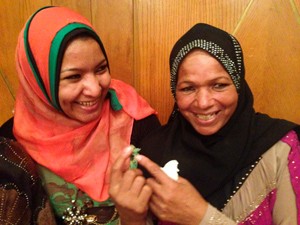
For Immediate Release
Cairo – The U.S. Government announced today that it created 1,400 jobs and provided in-kind micro-grants to 2,650 women to establish their own businesses in Upper Egypt. Through the USAID-funded Fostering Opportunities in Rural Southern Areas (FORSA) project, Pathfinder International trained more than 8,600 women in business management and life skills and trained 1,125 community health workers who provided advice and information to families about reproductive health, maternal and child health, and family planning.
“Investing in women helps lift families out of poverty,” said Dr. Nabil Alsoufi, USAID/Egypt Health Director. “Providing both economic empowerment and health information leads to healthier, more productive families that contribute to society.”
Recognizing the direct links between microfinance, economic growth, productivity, and improved health outcomes, the FORSA Project provided immediate job opportunities for young men and women in rural areas of Assuit and Sohag governorates who provided health advice and information to 112,500 households in Upper Egypt. Through this three-year project that concludes this month, FORSA also built the capacity of women and provides them with in-kind support so they can start their own microenterprises, thus helping alleviate poverty.
Over the past 30 years, the U.S. Government, through USAID, has invested $1.5 billion to improve the health of the Egyptian people. In addition to improving the health and well-being of Egyptians through increasing the skills of health care workers, the American people have contributed to infrastructure projects that have provided water, electricity, and telephone services to nearly all of Egypt; education projects that have contributed to doubling the number of girls in schools; and health projects that have led to an 80 percent reduction in infant mortality.
Related Press Releases
- 10,000 Community Health Volunteers Receive Equipment from USAID’s Community Capacity for Health Program
- Afghanistan Ministry of Public Health Launches First Data Warehouse for the Health Sector with help from USAID
- USAID and the National Center or Healthy Lifestyles Promotion Conduct Training for Journalists on Tuberculosis Reporting







Comment
Make a general inquiry or suggest an improvement.